Evaluating The Contemporary Business Environment - Impact of COVID-19 on UK Economy
VerifiedAdded on 2023/06/18
|13
|4435
|411
AI Summary
This report examines the impacts of COVID-19 on the economic growth of UK and the respective measures undertaken by the government so as to overcome the concerning impacts. The schemes launched by Bank of England to support small businesses and households in the COVID-19 pandemic are also been mentioned in this report.
Contribute Materials
Your contribution can guide someone’s learning journey. Share your
documents today.
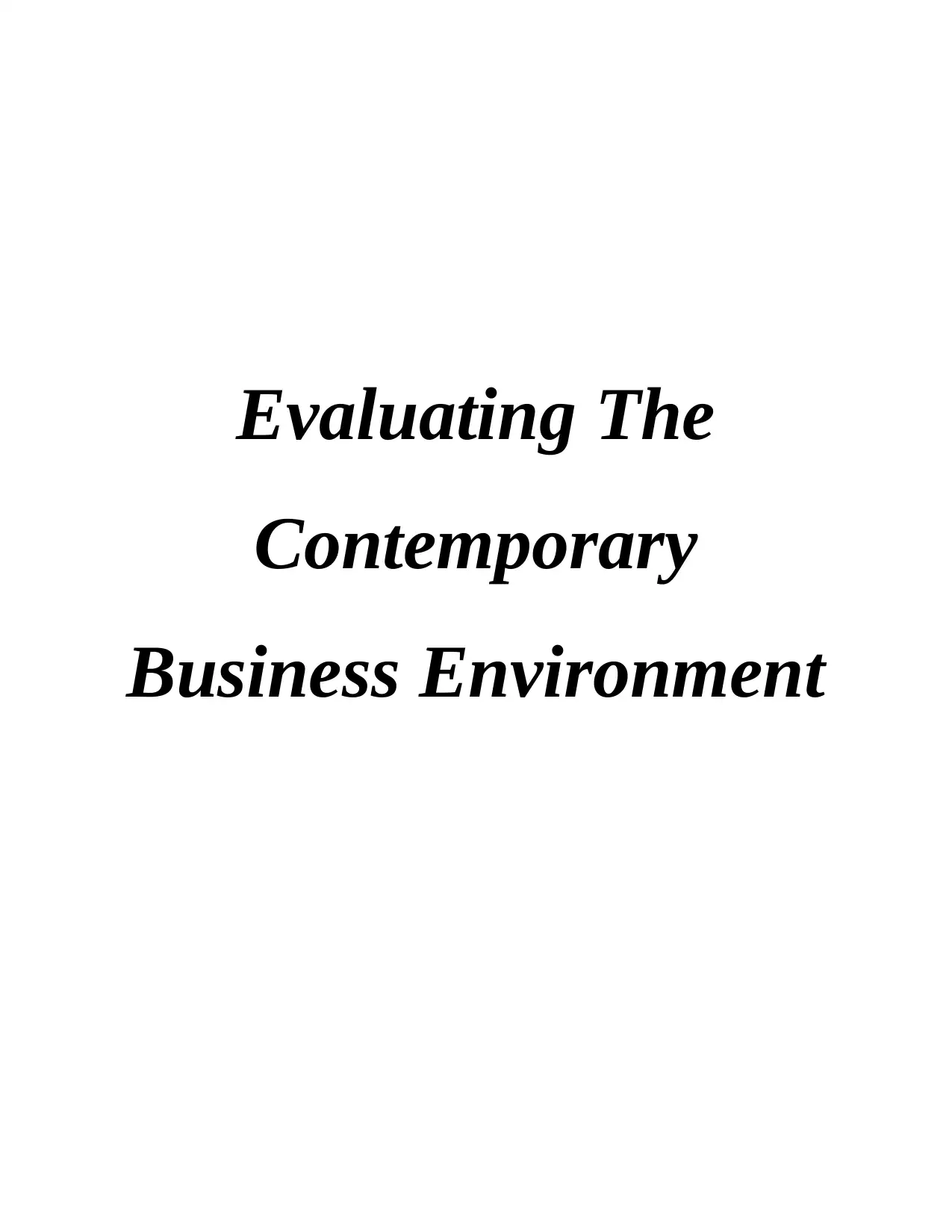
Evaluating The
Contemporary
Business Environment
Contemporary
Business Environment
Secure Best Marks with AI Grader
Need help grading? Try our AI Grader for instant feedback on your assignments.
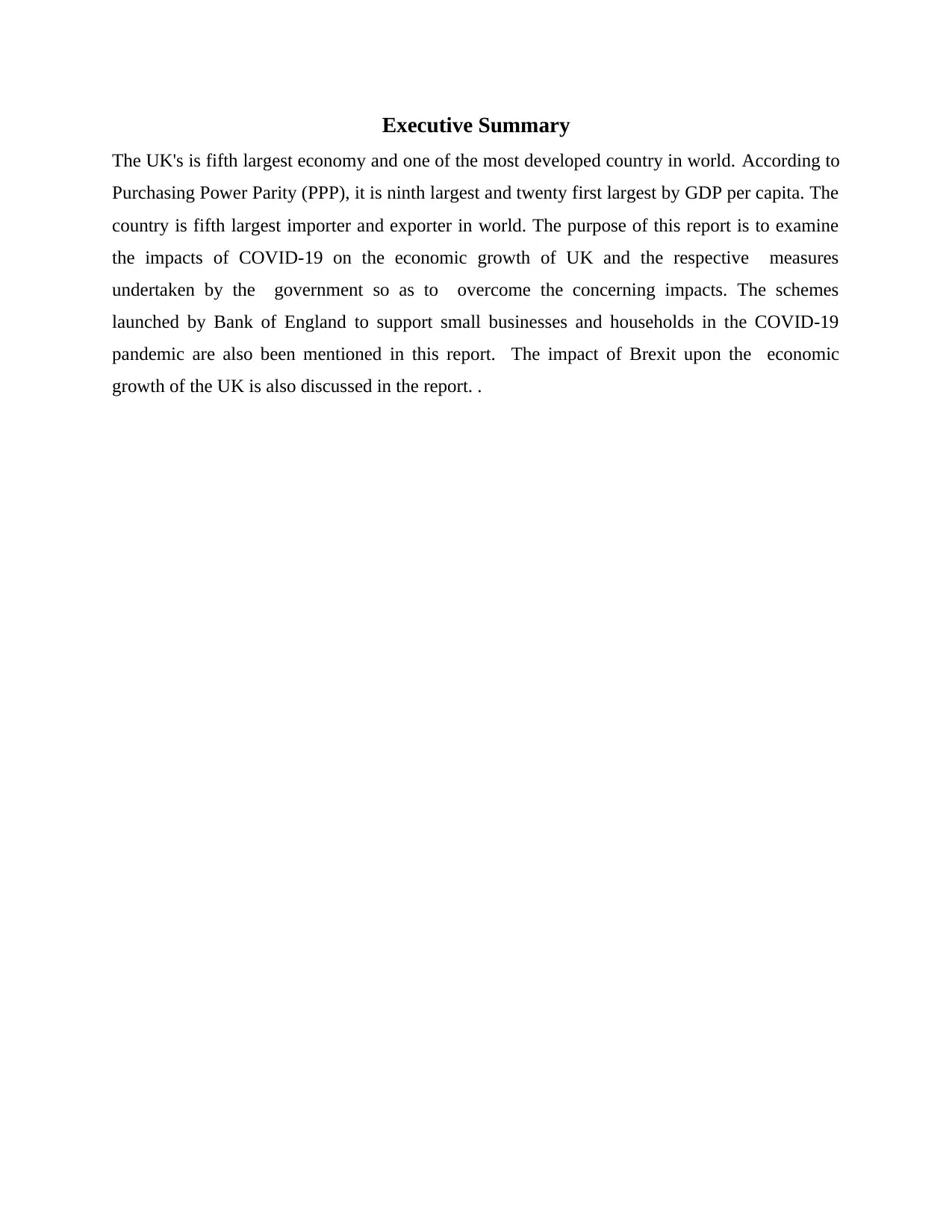
Executive Summary
The UK's is fifth largest economy and one of the most developed country in world. According to
Purchasing Power Parity (PPP), it is ninth largest and twenty first largest by GDP per capita. The
country is fifth largest importer and exporter in world. The purpose of this report is to examine
the impacts of COVID-19 on the economic growth of UK and the respective measures
undertaken by the government so as to overcome the concerning impacts. The schemes
launched by Bank of England to support small businesses and households in the COVID-19
pandemic are also been mentioned in this report. The impact of Brexit upon the economic
growth of the UK is also discussed in the report. .
The UK's is fifth largest economy and one of the most developed country in world. According to
Purchasing Power Parity (PPP), it is ninth largest and twenty first largest by GDP per capita. The
country is fifth largest importer and exporter in world. The purpose of this report is to examine
the impacts of COVID-19 on the economic growth of UK and the respective measures
undertaken by the government so as to overcome the concerning impacts. The schemes
launched by Bank of England to support small businesses and households in the COVID-19
pandemic are also been mentioned in this report. The impact of Brexit upon the economic
growth of the UK is also discussed in the report. .
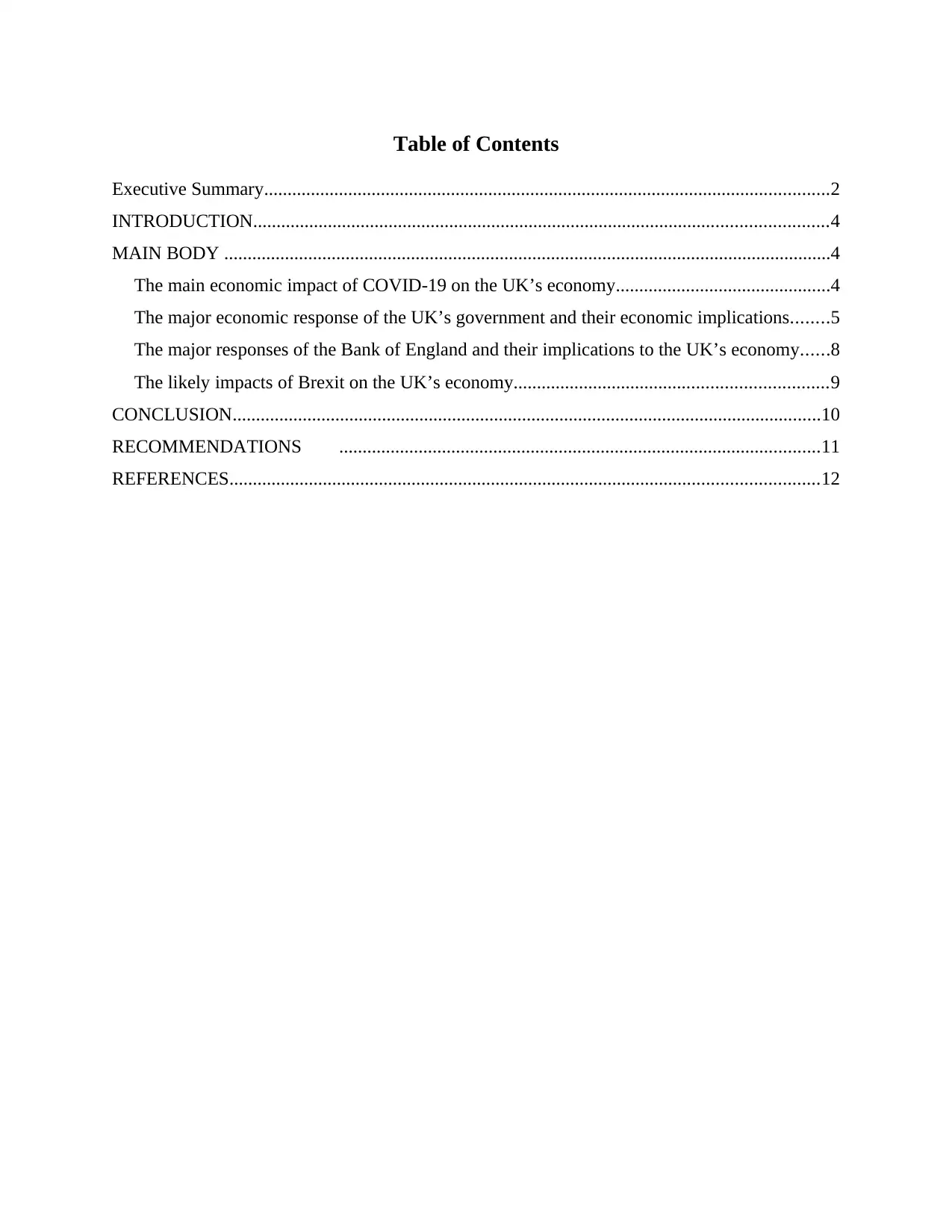
Table of Contents
Executive Summary.........................................................................................................................2
INTRODUCTION...........................................................................................................................4
MAIN BODY ..................................................................................................................................4
The main economic impact of COVID-19 on the UK’s economy..............................................4
The major economic response of the UK’s government and their economic implications........5
The major responses of the Bank of England and their implications to the UK’s economy......8
The likely impacts of Brexit on the UK’s economy...................................................................9
CONCLUSION..............................................................................................................................10
RECOMMENDATIONS .......................................................................................................11
REFERENCES..............................................................................................................................12
Executive Summary.........................................................................................................................2
INTRODUCTION...........................................................................................................................4
MAIN BODY ..................................................................................................................................4
The main economic impact of COVID-19 on the UK’s economy..............................................4
The major economic response of the UK’s government and their economic implications........5
The major responses of the Bank of England and their implications to the UK’s economy......8
The likely impacts of Brexit on the UK’s economy...................................................................9
CONCLUSION..............................................................................................................................10
RECOMMENDATIONS .......................................................................................................11
REFERENCES..............................................................................................................................12
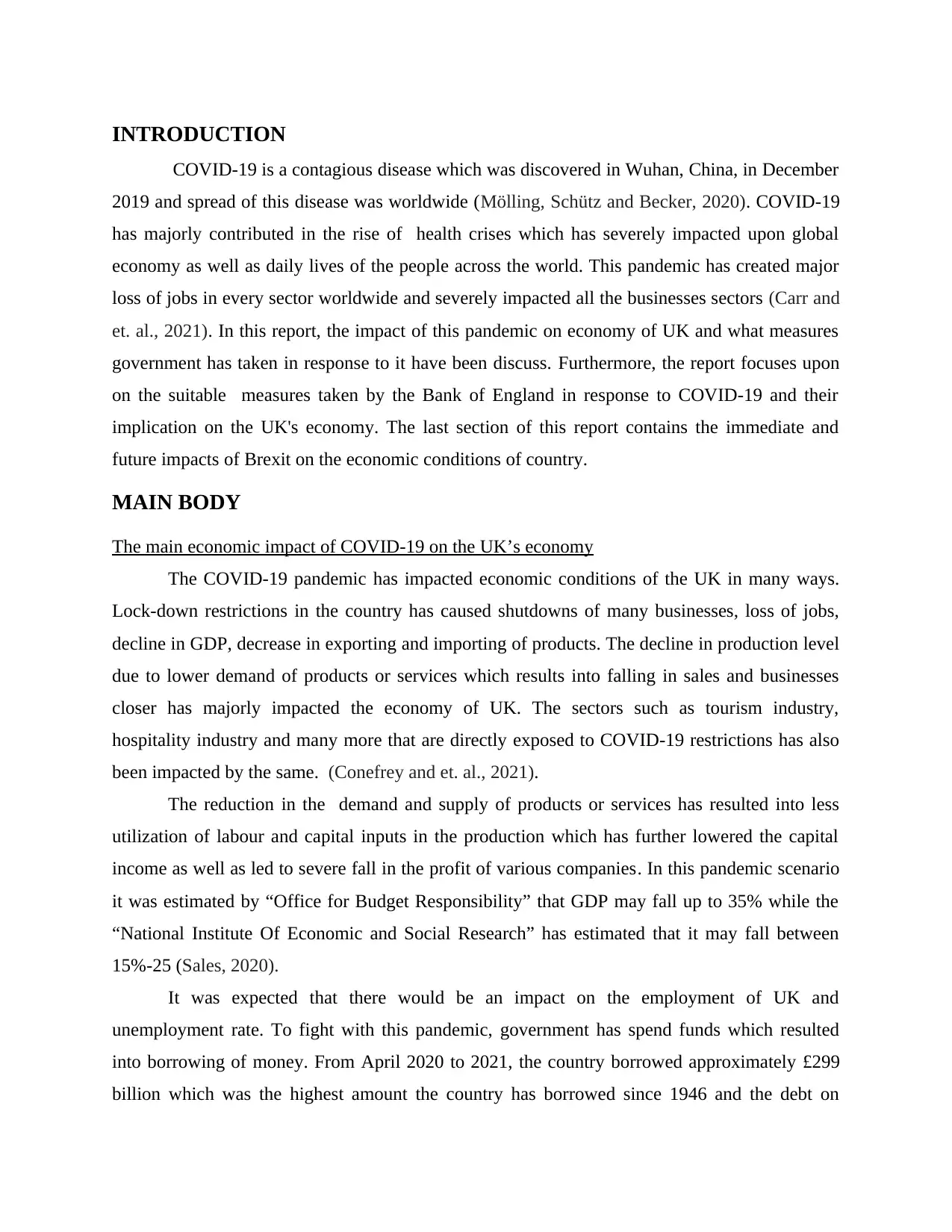
INTRODUCTION
COVID-19 is a contagious disease which was discovered in Wuhan, China, in December
2019 and spread of this disease was worldwide (Mölling, Schütz and Becker, 2020). COVID-19
has majorly contributed in the rise of health crises which has severely impacted upon global
economy as well as daily lives of the people across the world. This pandemic has created major
loss of jobs in every sector worldwide and severely impacted all the businesses sectors (Carr and
et. al., 2021). In this report, the impact of this pandemic on economy of UK and what measures
government has taken in response to it have been discuss. Furthermore, the report focuses upon
on the suitable measures taken by the Bank of England in response to COVID-19 and their
implication on the UK's economy. The last section of this report contains the immediate and
future impacts of Brexit on the economic conditions of country.
MAIN BODY
The main economic impact of COVID-19 on the UK’s economy
The COVID-19 pandemic has impacted economic conditions of the UK in many ways.
Lock-down restrictions in the country has caused shutdowns of many businesses, loss of jobs,
decline in GDP, decrease in exporting and importing of products. The decline in production level
due to lower demand of products or services which results into falling in sales and businesses
closer has majorly impacted the economy of UK. The sectors such as tourism industry,
hospitality industry and many more that are directly exposed to COVID-19 restrictions has also
been impacted by the same. (Conefrey and et. al., 2021).
The reduction in the demand and supply of products or services has resulted into less
utilization of labour and capital inputs in the production which has further lowered the capital
income as well as led to severe fall in the profit of various companies. In this pandemic scenario
it was estimated by “Office for Budget Responsibility” that GDP may fall up to 35% while the
“National Institute Of Economic and Social Research” has estimated that it may fall between
15%-25 (Sales, 2020).
It was expected that there would be an impact on the employment of UK and
unemployment rate. To fight with this pandemic, government has spend funds which resulted
into borrowing of money. From April 2020 to 2021, the country borrowed approximately £299
billion which was the highest amount the country has borrowed since 1946 and the debt on
COVID-19 is a contagious disease which was discovered in Wuhan, China, in December
2019 and spread of this disease was worldwide (Mölling, Schütz and Becker, 2020). COVID-19
has majorly contributed in the rise of health crises which has severely impacted upon global
economy as well as daily lives of the people across the world. This pandemic has created major
loss of jobs in every sector worldwide and severely impacted all the businesses sectors (Carr and
et. al., 2021). In this report, the impact of this pandemic on economy of UK and what measures
government has taken in response to it have been discuss. Furthermore, the report focuses upon
on the suitable measures taken by the Bank of England in response to COVID-19 and their
implication on the UK's economy. The last section of this report contains the immediate and
future impacts of Brexit on the economic conditions of country.
MAIN BODY
The main economic impact of COVID-19 on the UK’s economy
The COVID-19 pandemic has impacted economic conditions of the UK in many ways.
Lock-down restrictions in the country has caused shutdowns of many businesses, loss of jobs,
decline in GDP, decrease in exporting and importing of products. The decline in production level
due to lower demand of products or services which results into falling in sales and businesses
closer has majorly impacted the economy of UK. The sectors such as tourism industry,
hospitality industry and many more that are directly exposed to COVID-19 restrictions has also
been impacted by the same. (Conefrey and et. al., 2021).
The reduction in the demand and supply of products or services has resulted into less
utilization of labour and capital inputs in the production which has further lowered the capital
income as well as led to severe fall in the profit of various companies. In this pandemic scenario
it was estimated by “Office for Budget Responsibility” that GDP may fall up to 35% while the
“National Institute Of Economic and Social Research” has estimated that it may fall between
15%-25 (Sales, 2020).
It was expected that there would be an impact on the employment of UK and
unemployment rate. To fight with this pandemic, government has spend funds which resulted
into borrowing of money. From April 2020 to 2021, the country borrowed approximately £299
billion which was the highest amount the country has borrowed since 1946 and the debt on
Secure Best Marks with AI Grader
Need help grading? Try our AI Grader for instant feedback on your assignments.
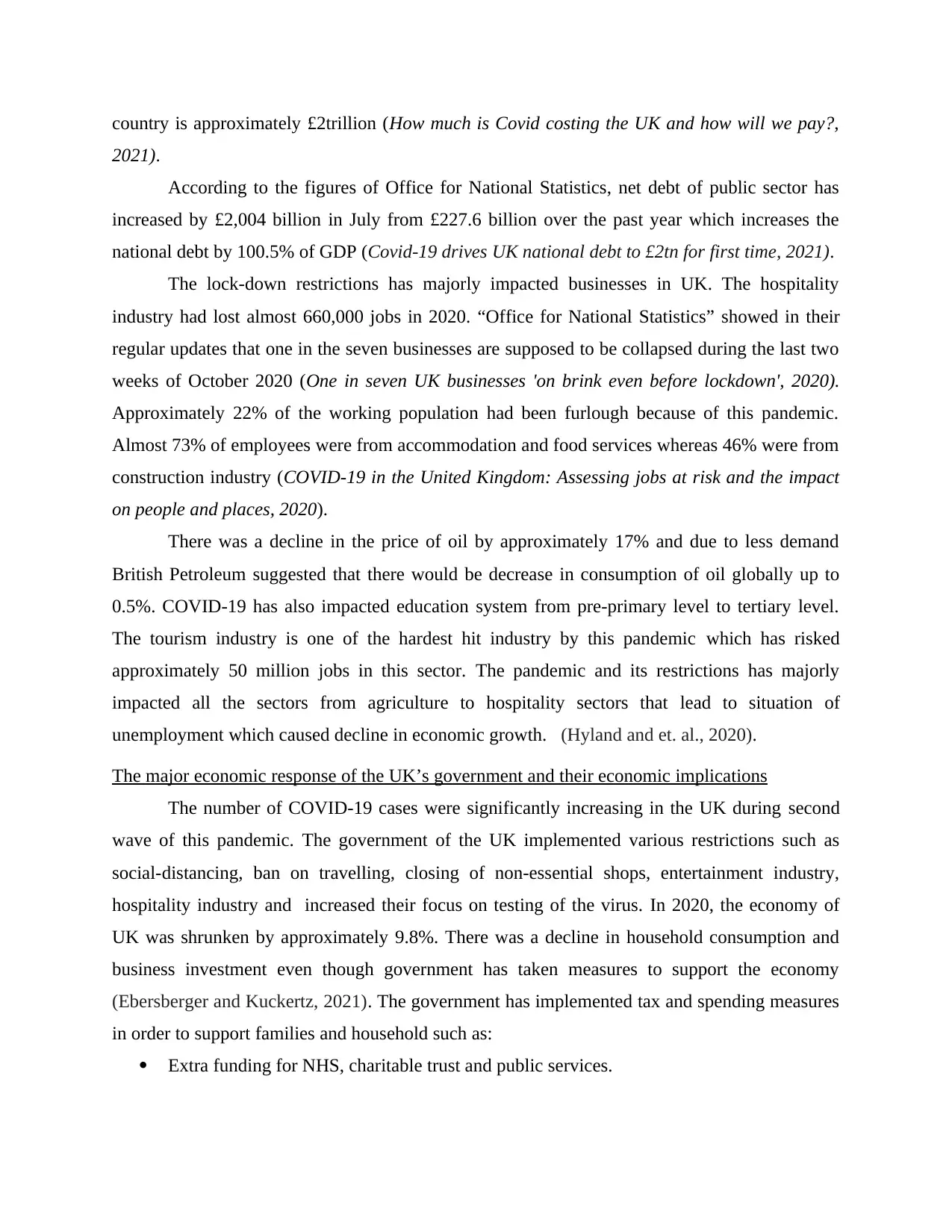
country is approximately £2trillion (How much is Covid costing the UK and how will we pay?,
2021).
According to the figures of Office for National Statistics, net debt of public sector has
increased by £2,004 billion in July from £227.6 billion over the past year which increases the
national debt by 100.5% of GDP (Covid-19 drives UK national debt to £2tn for first time, 2021).
The lock-down restrictions has majorly impacted businesses in UK. The hospitality
industry had lost almost 660,000 jobs in 2020. “Office for National Statistics” showed in their
regular updates that one in the seven businesses are supposed to be collapsed during the last two
weeks of October 2020 (One in seven UK businesses 'on brink even before lockdown', 2020).
Approximately 22% of the working population had been furlough because of this pandemic.
Almost 73% of employees were from accommodation and food services whereas 46% were from
construction industry (COVID-19 in the United Kingdom: Assessing jobs at risk and the impact
on people and places, 2020).
There was a decline in the price of oil by approximately 17% and due to less demand
British Petroleum suggested that there would be decrease in consumption of oil globally up to
0.5%. COVID-19 has also impacted education system from pre-primary level to tertiary level.
The tourism industry is one of the hardest hit industry by this pandemic which has risked
approximately 50 million jobs in this sector. The pandemic and its restrictions has majorly
impacted all the sectors from agriculture to hospitality sectors that lead to situation of
unemployment which caused decline in economic growth. (Hyland and et. al., 2020).
The major economic response of the UK’s government and their economic implications
The number of COVID-19 cases were significantly increasing in the UK during second
wave of this pandemic. The government of the UK implemented various restrictions such as
social-distancing, ban on travelling, closing of non-essential shops, entertainment industry,
hospitality industry and increased their focus on testing of the virus. In 2020, the economy of
UK was shrunken by approximately 9.8%. There was a decline in household consumption and
business investment even though government has taken measures to support the economy
(Ebersberger and Kuckertz, 2021). The government has implemented tax and spending measures
in order to support families and household such as:
Extra funding for NHS, charitable trust and public services.
2021).
According to the figures of Office for National Statistics, net debt of public sector has
increased by £2,004 billion in July from £227.6 billion over the past year which increases the
national debt by 100.5% of GDP (Covid-19 drives UK national debt to £2tn for first time, 2021).
The lock-down restrictions has majorly impacted businesses in UK. The hospitality
industry had lost almost 660,000 jobs in 2020. “Office for National Statistics” showed in their
regular updates that one in the seven businesses are supposed to be collapsed during the last two
weeks of October 2020 (One in seven UK businesses 'on brink even before lockdown', 2020).
Approximately 22% of the working population had been furlough because of this pandemic.
Almost 73% of employees were from accommodation and food services whereas 46% were from
construction industry (COVID-19 in the United Kingdom: Assessing jobs at risk and the impact
on people and places, 2020).
There was a decline in the price of oil by approximately 17% and due to less demand
British Petroleum suggested that there would be decrease in consumption of oil globally up to
0.5%. COVID-19 has also impacted education system from pre-primary level to tertiary level.
The tourism industry is one of the hardest hit industry by this pandemic which has risked
approximately 50 million jobs in this sector. The pandemic and its restrictions has majorly
impacted all the sectors from agriculture to hospitality sectors that lead to situation of
unemployment which caused decline in economic growth. (Hyland and et. al., 2020).
The major economic response of the UK’s government and their economic implications
The number of COVID-19 cases were significantly increasing in the UK during second
wave of this pandemic. The government of the UK implemented various restrictions such as
social-distancing, ban on travelling, closing of non-essential shops, entertainment industry,
hospitality industry and increased their focus on testing of the virus. In 2020, the economy of
UK was shrunken by approximately 9.8%. There was a decline in household consumption and
business investment even though government has taken measures to support the economy
(Ebersberger and Kuckertz, 2021). The government has implemented tax and spending measures
in order to support families and household such as:
Extra funding for NHS, charitable trust and public services.
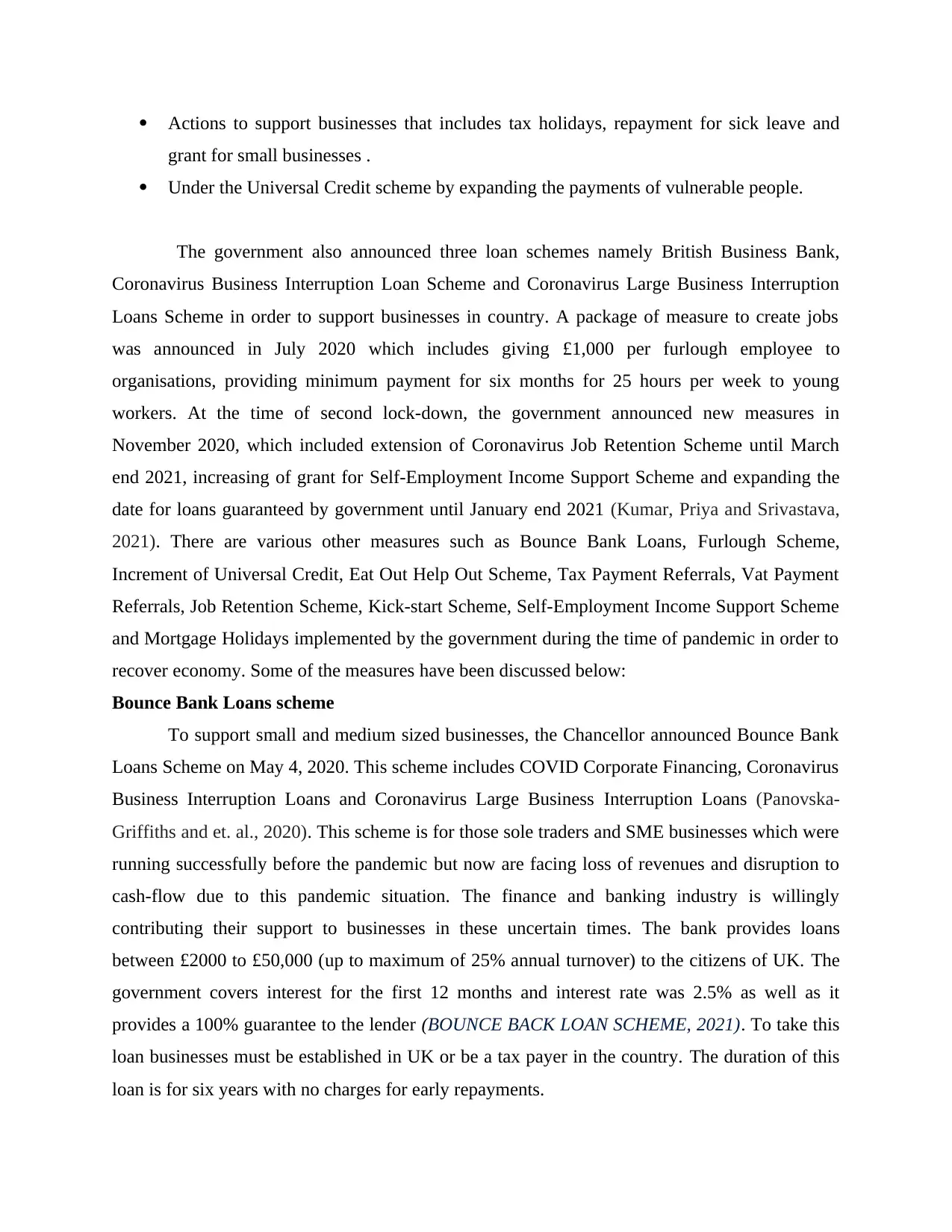
Actions to support businesses that includes tax holidays, repayment for sick leave and
grant for small businesses .
Under the Universal Credit scheme by expanding the payments of vulnerable people.
The government also announced three loan schemes namely British Business Bank,
Coronavirus Business Interruption Loan Scheme and Coronavirus Large Business Interruption
Loans Scheme in order to support businesses in country. A package of measure to create jobs
was announced in July 2020 which includes giving £1,000 per furlough employee to
organisations, providing minimum payment for six months for 25 hours per week to young
workers. At the time of second lock-down, the government announced new measures in
November 2020, which included extension of Coronavirus Job Retention Scheme until March
end 2021, increasing of grant for Self-Employment Income Support Scheme and expanding the
date for loans guaranteed by government until January end 2021 (Kumar, Priya and Srivastava,
2021). There are various other measures such as Bounce Bank Loans, Furlough Scheme,
Increment of Universal Credit, Eat Out Help Out Scheme, Tax Payment Referrals, Vat Payment
Referrals, Job Retention Scheme, Kick-start Scheme, Self-Employment Income Support Scheme
and Mortgage Holidays implemented by the government during the time of pandemic in order to
recover economy. Some of the measures have been discussed below:
Bounce Bank Loans scheme
To support small and medium sized businesses, the Chancellor announced Bounce Bank
Loans Scheme on May 4, 2020. This scheme includes COVID Corporate Financing, Coronavirus
Business Interruption Loans and Coronavirus Large Business Interruption Loans (Panovska-
Griffiths and et. al., 2020). This scheme is for those sole traders and SME businesses which were
running successfully before the pandemic but now are facing loss of revenues and disruption to
cash-flow due to this pandemic situation. The finance and banking industry is willingly
contributing their support to businesses in these uncertain times. The bank provides loans
between £2000 to £50,000 (up to maximum of 25% annual turnover) to the citizens of UK. The
government covers interest for the first 12 months and interest rate was 2.5% as well as it
provides a 100% guarantee to the lender (BOUNCE BACK LOAN SCHEME, 2021). To take this
loan businesses must be established in UK or be a tax payer in the country. The duration of this
loan is for six years with no charges for early repayments.
grant for small businesses .
Under the Universal Credit scheme by expanding the payments of vulnerable people.
The government also announced three loan schemes namely British Business Bank,
Coronavirus Business Interruption Loan Scheme and Coronavirus Large Business Interruption
Loans Scheme in order to support businesses in country. A package of measure to create jobs
was announced in July 2020 which includes giving £1,000 per furlough employee to
organisations, providing minimum payment for six months for 25 hours per week to young
workers. At the time of second lock-down, the government announced new measures in
November 2020, which included extension of Coronavirus Job Retention Scheme until March
end 2021, increasing of grant for Self-Employment Income Support Scheme and expanding the
date for loans guaranteed by government until January end 2021 (Kumar, Priya and Srivastava,
2021). There are various other measures such as Bounce Bank Loans, Furlough Scheme,
Increment of Universal Credit, Eat Out Help Out Scheme, Tax Payment Referrals, Vat Payment
Referrals, Job Retention Scheme, Kick-start Scheme, Self-Employment Income Support Scheme
and Mortgage Holidays implemented by the government during the time of pandemic in order to
recover economy. Some of the measures have been discussed below:
Bounce Bank Loans scheme
To support small and medium sized businesses, the Chancellor announced Bounce Bank
Loans Scheme on May 4, 2020. This scheme includes COVID Corporate Financing, Coronavirus
Business Interruption Loans and Coronavirus Large Business Interruption Loans (Panovska-
Griffiths and et. al., 2020). This scheme is for those sole traders and SME businesses which were
running successfully before the pandemic but now are facing loss of revenues and disruption to
cash-flow due to this pandemic situation. The finance and banking industry is willingly
contributing their support to businesses in these uncertain times. The bank provides loans
between £2000 to £50,000 (up to maximum of 25% annual turnover) to the citizens of UK. The
government covers interest for the first 12 months and interest rate was 2.5% as well as it
provides a 100% guarantee to the lender (BOUNCE BACK LOAN SCHEME, 2021). To take this
loan businesses must be established in UK or be a tax payer in the country. The duration of this
loan is for six years with no charges for early repayments.
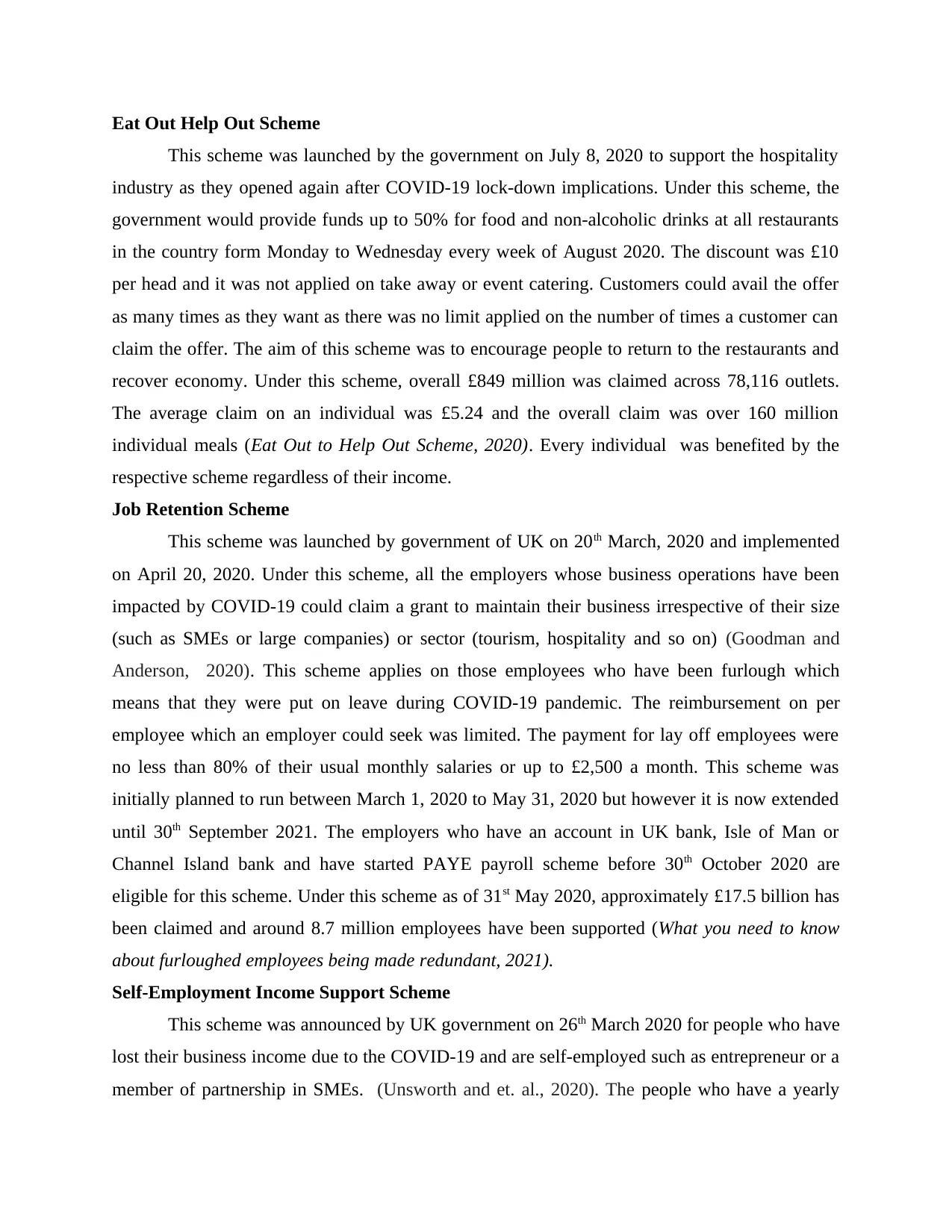
Eat Out Help Out Scheme
This scheme was launched by the government on July 8, 2020 to support the hospitality
industry as they opened again after COVID-19 lock-down implications. Under this scheme, the
government would provide funds up to 50% for food and non-alcoholic drinks at all restaurants
in the country form Monday to Wednesday every week of August 2020. The discount was £10
per head and it was not applied on take away or event catering. Customers could avail the offer
as many times as they want as there was no limit applied on the number of times a customer can
claim the offer. The aim of this scheme was to encourage people to return to the restaurants and
recover economy. Under this scheme, overall £849 million was claimed across 78,116 outlets.
The average claim on an individual was £5.24 and the overall claim was over 160 million
individual meals (Eat Out to Help Out Scheme, 2020). Every individual was benefited by the
respective scheme regardless of their income.
Job Retention Scheme
This scheme was launched by government of UK on 20th March, 2020 and implemented
on April 20, 2020. Under this scheme, all the employers whose business operations have been
impacted by COVID-19 could claim a grant to maintain their business irrespective of their size
(such as SMEs or large companies) or sector (tourism, hospitality and so on) (Goodman and
Anderson, 2020). This scheme applies on those employees who have been furlough which
means that they were put on leave during COVID-19 pandemic. The reimbursement on per
employee which an employer could seek was limited. The payment for lay off employees were
no less than 80% of their usual monthly salaries or up to £2,500 a month. This scheme was
initially planned to run between March 1, 2020 to May 31, 2020 but however it is now extended
until 30th September 2021. The employers who have an account in UK bank, Isle of Man or
Channel Island bank and have started PAYE payroll scheme before 30th October 2020 are
eligible for this scheme. Under this scheme as of 31st May 2020, approximately £17.5 billion has
been claimed and around 8.7 million employees have been supported (What you need to know
about furloughed employees being made redundant, 2021).
Self-Employment Income Support Scheme
This scheme was announced by UK government on 26th March 2020 for people who have
lost their business income due to the COVID-19 and are self-employed such as entrepreneur or a
member of partnership in SMEs. (Unsworth and et. al., 2020). The people who have a yearly
This scheme was launched by the government on July 8, 2020 to support the hospitality
industry as they opened again after COVID-19 lock-down implications. Under this scheme, the
government would provide funds up to 50% for food and non-alcoholic drinks at all restaurants
in the country form Monday to Wednesday every week of August 2020. The discount was £10
per head and it was not applied on take away or event catering. Customers could avail the offer
as many times as they want as there was no limit applied on the number of times a customer can
claim the offer. The aim of this scheme was to encourage people to return to the restaurants and
recover economy. Under this scheme, overall £849 million was claimed across 78,116 outlets.
The average claim on an individual was £5.24 and the overall claim was over 160 million
individual meals (Eat Out to Help Out Scheme, 2020). Every individual was benefited by the
respective scheme regardless of their income.
Job Retention Scheme
This scheme was launched by government of UK on 20th March, 2020 and implemented
on April 20, 2020. Under this scheme, all the employers whose business operations have been
impacted by COVID-19 could claim a grant to maintain their business irrespective of their size
(such as SMEs or large companies) or sector (tourism, hospitality and so on) (Goodman and
Anderson, 2020). This scheme applies on those employees who have been furlough which
means that they were put on leave during COVID-19 pandemic. The reimbursement on per
employee which an employer could seek was limited. The payment for lay off employees were
no less than 80% of their usual monthly salaries or up to £2,500 a month. This scheme was
initially planned to run between March 1, 2020 to May 31, 2020 but however it is now extended
until 30th September 2021. The employers who have an account in UK bank, Isle of Man or
Channel Island bank and have started PAYE payroll scheme before 30th October 2020 are
eligible for this scheme. Under this scheme as of 31st May 2020, approximately £17.5 billion has
been claimed and around 8.7 million employees have been supported (What you need to know
about furloughed employees being made redundant, 2021).
Self-Employment Income Support Scheme
This scheme was announced by UK government on 26th March 2020 for people who have
lost their business income due to the COVID-19 and are self-employed such as entrepreneur or a
member of partnership in SMEs. (Unsworth and et. al., 2020). The people who have a yearly
Paraphrase This Document
Need a fresh take? Get an instant paraphrase of this document with our AI Paraphraser
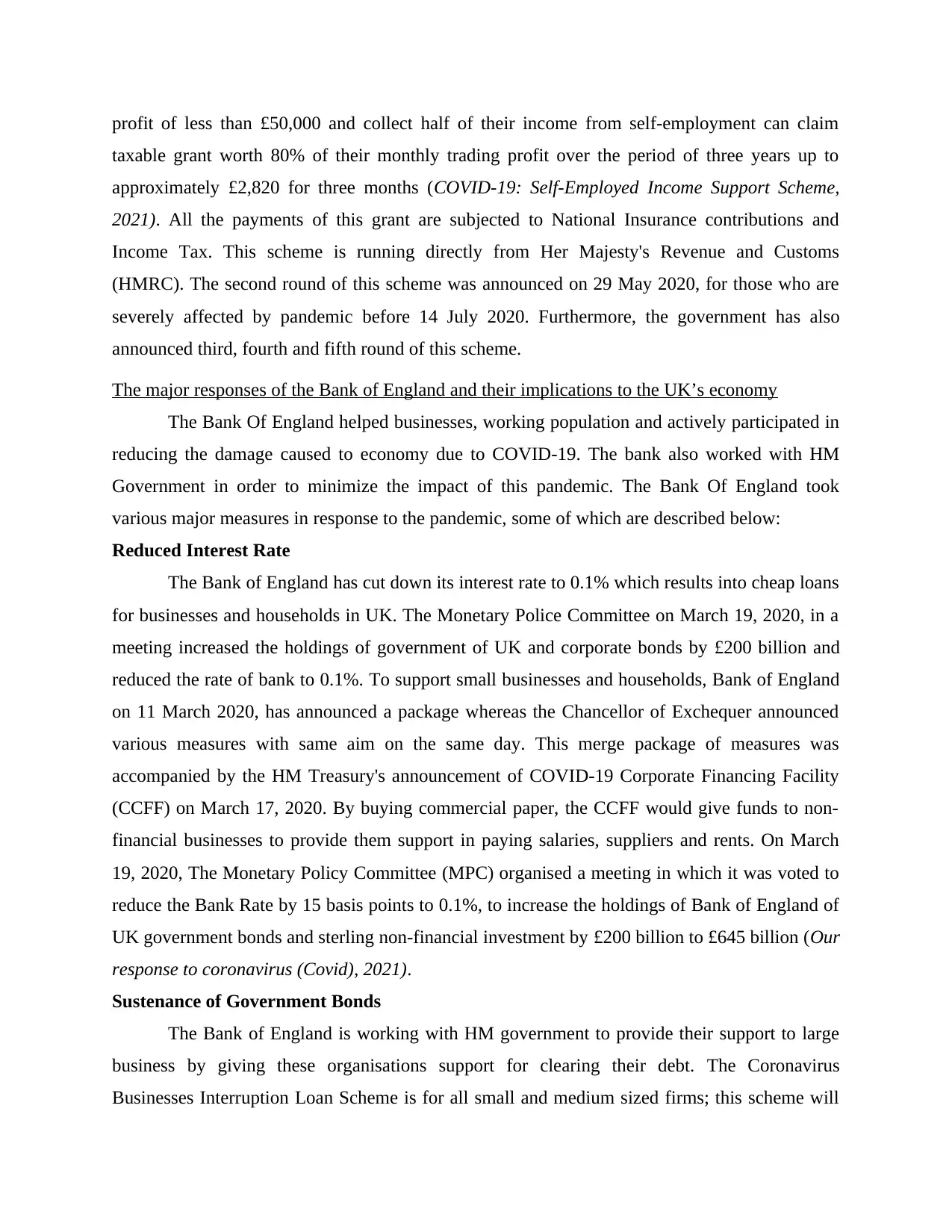
profit of less than £50,000 and collect half of their income from self-employment can claim
taxable grant worth 80% of their monthly trading profit over the period of three years up to
approximately £2,820 for three months (COVID-19: Self-Employed Income Support Scheme,
2021). All the payments of this grant are subjected to National Insurance contributions and
Income Tax. This scheme is running directly from Her Majesty's Revenue and Customs
(HMRC). The second round of this scheme was announced on 29 May 2020, for those who are
severely affected by pandemic before 14 July 2020. Furthermore, the government has also
announced third, fourth and fifth round of this scheme.
The major responses of the Bank of England and their implications to the UK’s economy
The Bank Of England helped businesses, working population and actively participated in
reducing the damage caused to economy due to COVID-19. The bank also worked with HM
Government in order to minimize the impact of this pandemic. The Bank Of England took
various major measures in response to the pandemic, some of which are described below:
Reduced Interest Rate
The Bank of England has cut down its interest rate to 0.1% which results into cheap loans
for businesses and households in UK. The Monetary Police Committee on March 19, 2020, in a
meeting increased the holdings of government of UK and corporate bonds by £200 billion and
reduced the rate of bank to 0.1%. To support small businesses and households, Bank of England
on 11 March 2020, has announced a package whereas the Chancellor of Exchequer announced
various measures with same aim on the same day. This merge package of measures was
accompanied by the HM Treasury's announcement of COVID-19 Corporate Financing Facility
(CCFF) on March 17, 2020. By buying commercial paper, the CCFF would give funds to non-
financial businesses to provide them support in paying salaries, suppliers and rents. On March
19, 2020, The Monetary Policy Committee (MPC) organised a meeting in which it was voted to
reduce the Bank Rate by 15 basis points to 0.1%, to increase the holdings of Bank of England of
UK government bonds and sterling non-financial investment by £200 billion to £645 billion (Our
response to coronavirus (Covid), 2021).
Sustenance of Government Bonds
The Bank of England is working with HM government to provide their support to large
business by giving these organisations support for clearing their debt. The Coronavirus
Businesses Interruption Loan Scheme is for all small and medium sized firms; this scheme will
taxable grant worth 80% of their monthly trading profit over the period of three years up to
approximately £2,820 for three months (COVID-19: Self-Employed Income Support Scheme,
2021). All the payments of this grant are subjected to National Insurance contributions and
Income Tax. This scheme is running directly from Her Majesty's Revenue and Customs
(HMRC). The second round of this scheme was announced on 29 May 2020, for those who are
severely affected by pandemic before 14 July 2020. Furthermore, the government has also
announced third, fourth and fifth round of this scheme.
The major responses of the Bank of England and their implications to the UK’s economy
The Bank Of England helped businesses, working population and actively participated in
reducing the damage caused to economy due to COVID-19. The bank also worked with HM
Government in order to minimize the impact of this pandemic. The Bank Of England took
various major measures in response to the pandemic, some of which are described below:
Reduced Interest Rate
The Bank of England has cut down its interest rate to 0.1% which results into cheap loans
for businesses and households in UK. The Monetary Police Committee on March 19, 2020, in a
meeting increased the holdings of government of UK and corporate bonds by £200 billion and
reduced the rate of bank to 0.1%. To support small businesses and households, Bank of England
on 11 March 2020, has announced a package whereas the Chancellor of Exchequer announced
various measures with same aim on the same day. This merge package of measures was
accompanied by the HM Treasury's announcement of COVID-19 Corporate Financing Facility
(CCFF) on March 17, 2020. By buying commercial paper, the CCFF would give funds to non-
financial businesses to provide them support in paying salaries, suppliers and rents. On March
19, 2020, The Monetary Policy Committee (MPC) organised a meeting in which it was voted to
reduce the Bank Rate by 15 basis points to 0.1%, to increase the holdings of Bank of England of
UK government bonds and sterling non-financial investment by £200 billion to £645 billion (Our
response to coronavirus (Covid), 2021).
Sustenance of Government Bonds
The Bank of England is working with HM government to provide their support to large
business by giving these organisations support for clearing their debt. The Coronavirus
Businesses Interruption Loan Scheme is for all small and medium sized firms; this scheme will
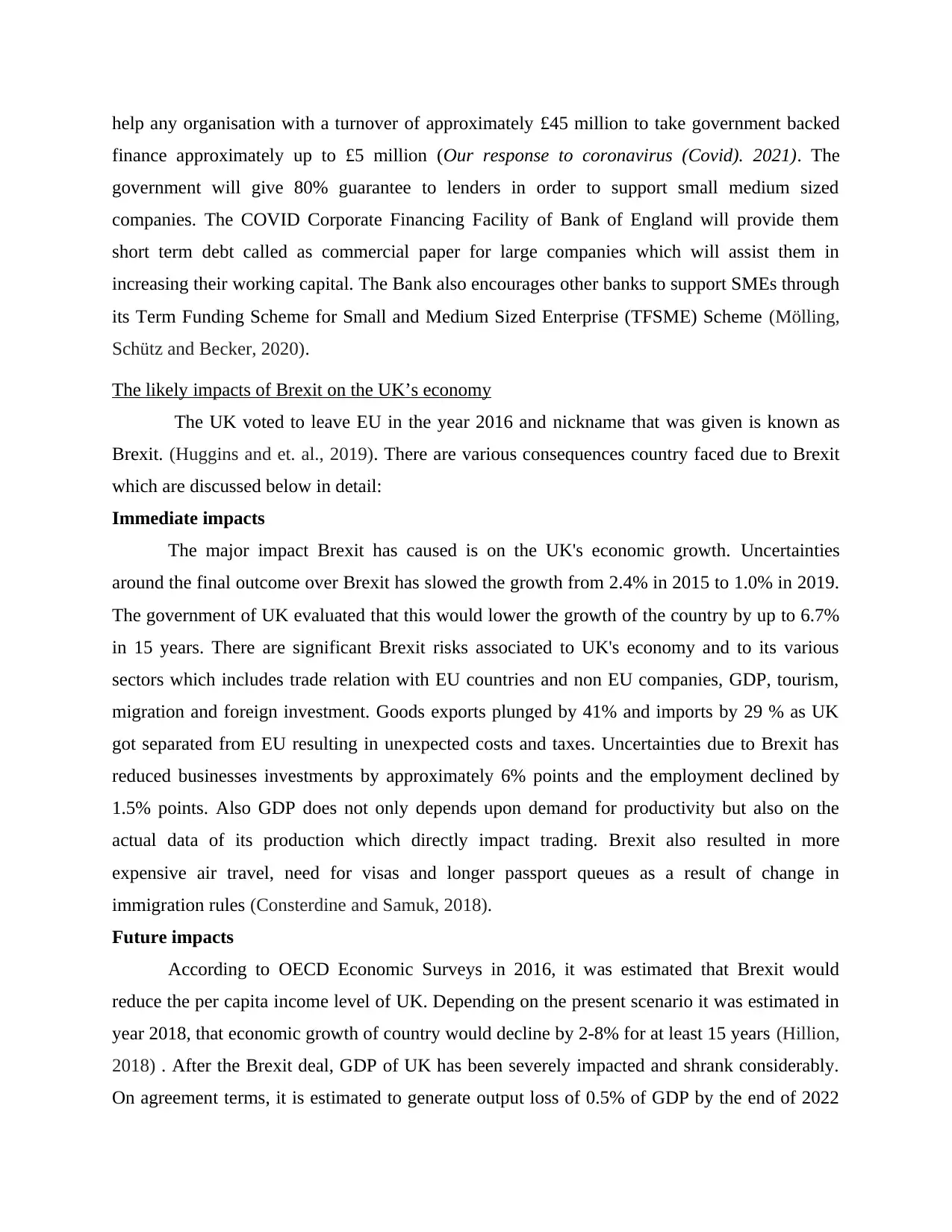
help any organisation with a turnover of approximately £45 million to take government backed
finance approximately up to £5 million (Our response to coronavirus (Covid). 2021). The
government will give 80% guarantee to lenders in order to support small medium sized
companies. The COVID Corporate Financing Facility of Bank of England will provide them
short term debt called as commercial paper for large companies which will assist them in
increasing their working capital. The Bank also encourages other banks to support SMEs through
its Term Funding Scheme for Small and Medium Sized Enterprise (TFSME) Scheme (Mölling,
Schütz and Becker, 2020).
The likely impacts of Brexit on the UK’s economy
The UK voted to leave EU in the year 2016 and nickname that was given is known as
Brexit. (Huggins and et. al., 2019). There are various consequences country faced due to Brexit
which are discussed below in detail:
Immediate impacts
The major impact Brexit has caused is on the UK's economic growth. Uncertainties
around the final outcome over Brexit has slowed the growth from 2.4% in 2015 to 1.0% in 2019.
The government of UK evaluated that this would lower the growth of the country by up to 6.7%
in 15 years. There are significant Brexit risks associated to UK's economy and to its various
sectors which includes trade relation with EU countries and non EU companies, GDP, tourism,
migration and foreign investment. Goods exports plunged by 41% and imports by 29 % as UK
got separated from EU resulting in unexpected costs and taxes. Uncertainties due to Brexit has
reduced businesses investments by approximately 6% points and the employment declined by
1.5% points. Also GDP does not only depends upon demand for productivity but also on the
actual data of its production which directly impact trading. Brexit also resulted in more
expensive air travel, need for visas and longer passport queues as a result of change in
immigration rules (Consterdine and Samuk, 2018).
Future impacts
According to OECD Economic Surveys in 2016, it was estimated that Brexit would
reduce the per capita income level of UK. Depending on the present scenario it was estimated in
year 2018, that economic growth of country would decline by 2-8% for at least 15 years (Hillion,
2018) . After the Brexit deal, GDP of UK has been severely impacted and shrank considerably.
On agreement terms, it is estimated to generate output loss of 0.5% of GDP by the end of 2022
finance approximately up to £5 million (Our response to coronavirus (Covid). 2021). The
government will give 80% guarantee to lenders in order to support small medium sized
companies. The COVID Corporate Financing Facility of Bank of England will provide them
short term debt called as commercial paper for large companies which will assist them in
increasing their working capital. The Bank also encourages other banks to support SMEs through
its Term Funding Scheme for Small and Medium Sized Enterprise (TFSME) Scheme (Mölling,
Schütz and Becker, 2020).
The likely impacts of Brexit on the UK’s economy
The UK voted to leave EU in the year 2016 and nickname that was given is known as
Brexit. (Huggins and et. al., 2019). There are various consequences country faced due to Brexit
which are discussed below in detail:
Immediate impacts
The major impact Brexit has caused is on the UK's economic growth. Uncertainties
around the final outcome over Brexit has slowed the growth from 2.4% in 2015 to 1.0% in 2019.
The government of UK evaluated that this would lower the growth of the country by up to 6.7%
in 15 years. There are significant Brexit risks associated to UK's economy and to its various
sectors which includes trade relation with EU countries and non EU companies, GDP, tourism,
migration and foreign investment. Goods exports plunged by 41% and imports by 29 % as UK
got separated from EU resulting in unexpected costs and taxes. Uncertainties due to Brexit has
reduced businesses investments by approximately 6% points and the employment declined by
1.5% points. Also GDP does not only depends upon demand for productivity but also on the
actual data of its production which directly impact trading. Brexit also resulted in more
expensive air travel, need for visas and longer passport queues as a result of change in
immigration rules (Consterdine and Samuk, 2018).
Future impacts
According to OECD Economic Surveys in 2016, it was estimated that Brexit would
reduce the per capita income level of UK. Depending on the present scenario it was estimated in
year 2018, that economic growth of country would decline by 2-8% for at least 15 years (Hillion,
2018) . After the Brexit deal, GDP of UK has been severely impacted and shrank considerably.
On agreement terms, it is estimated to generate output loss of 0.5% of GDP by the end of 2022
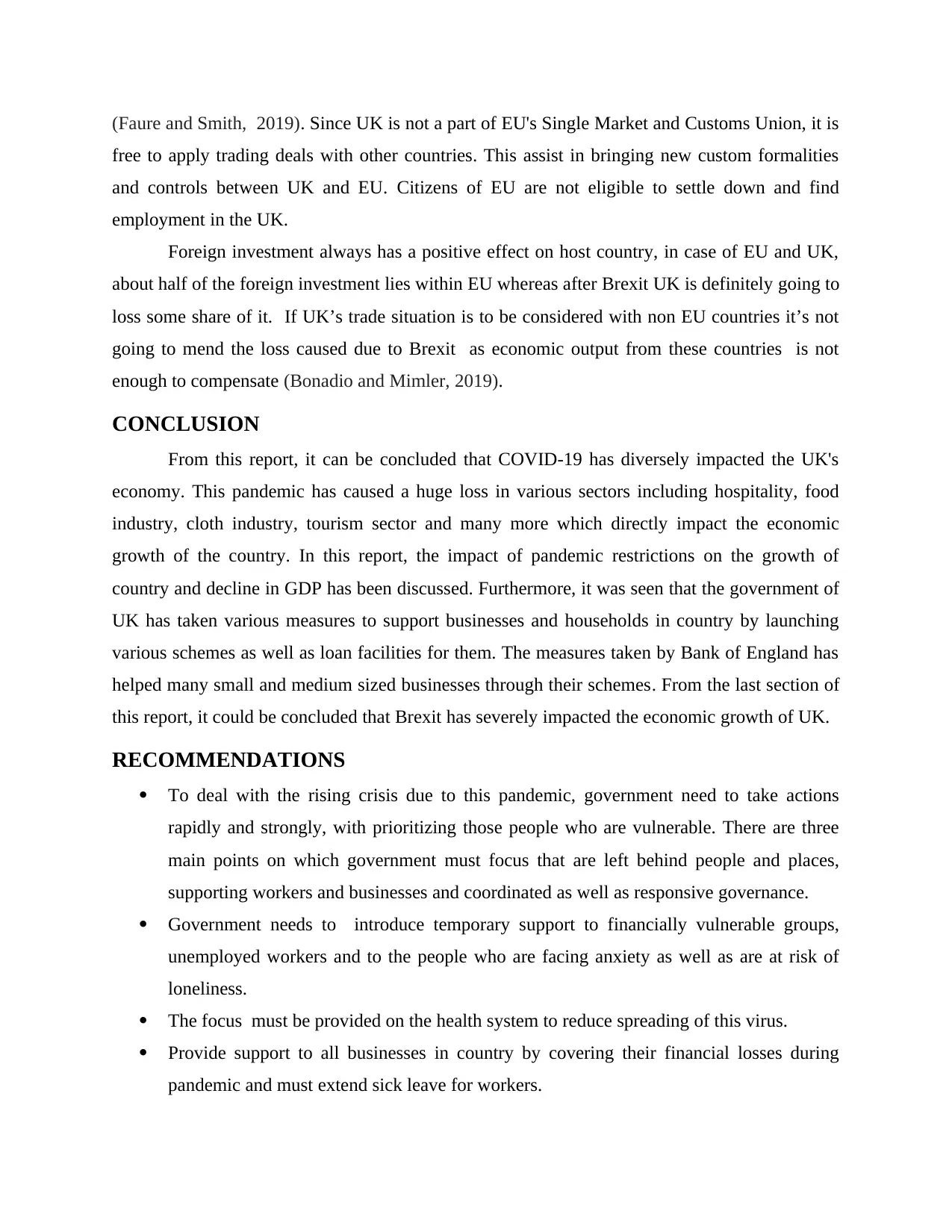
(Faure and Smith, 2019). Since UK is not a part of EU's Single Market and Customs Union, it is
free to apply trading deals with other countries. This assist in bringing new custom formalities
and controls between UK and EU. Citizens of EU are not eligible to settle down and find
employment in the UK.
Foreign investment always has a positive effect on host country, in case of EU and UK,
about half of the foreign investment lies within EU whereas after Brexit UK is definitely going to
loss some share of it. If UK’s trade situation is to be considered with non EU countries it’s not
going to mend the loss caused due to Brexit as economic output from these countries is not
enough to compensate (Bonadio and Mimler, 2019).
CONCLUSION
From this report, it can be concluded that COVID-19 has diversely impacted the UK's
economy. This pandemic has caused a huge loss in various sectors including hospitality, food
industry, cloth industry, tourism sector and many more which directly impact the economic
growth of the country. In this report, the impact of pandemic restrictions on the growth of
country and decline in GDP has been discussed. Furthermore, it was seen that the government of
UK has taken various measures to support businesses and households in country by launching
various schemes as well as loan facilities for them. The measures taken by Bank of England has
helped many small and medium sized businesses through their schemes. From the last section of
this report, it could be concluded that Brexit has severely impacted the economic growth of UK.
RECOMMENDATIONS
To deal with the rising crisis due to this pandemic, government need to take actions
rapidly and strongly, with prioritizing those people who are vulnerable. There are three
main points on which government must focus that are left behind people and places,
supporting workers and businesses and coordinated as well as responsive governance.
Government needs to introduce temporary support to financially vulnerable groups,
unemployed workers and to the people who are facing anxiety as well as are at risk of
loneliness.
The focus must be provided on the health system to reduce spreading of this virus.
Provide support to all businesses in country by covering their financial losses during
pandemic and must extend sick leave for workers.
free to apply trading deals with other countries. This assist in bringing new custom formalities
and controls between UK and EU. Citizens of EU are not eligible to settle down and find
employment in the UK.
Foreign investment always has a positive effect on host country, in case of EU and UK,
about half of the foreign investment lies within EU whereas after Brexit UK is definitely going to
loss some share of it. If UK’s trade situation is to be considered with non EU countries it’s not
going to mend the loss caused due to Brexit as economic output from these countries is not
enough to compensate (Bonadio and Mimler, 2019).
CONCLUSION
From this report, it can be concluded that COVID-19 has diversely impacted the UK's
economy. This pandemic has caused a huge loss in various sectors including hospitality, food
industry, cloth industry, tourism sector and many more which directly impact the economic
growth of the country. In this report, the impact of pandemic restrictions on the growth of
country and decline in GDP has been discussed. Furthermore, it was seen that the government of
UK has taken various measures to support businesses and households in country by launching
various schemes as well as loan facilities for them. The measures taken by Bank of England has
helped many small and medium sized businesses through their schemes. From the last section of
this report, it could be concluded that Brexit has severely impacted the economic growth of UK.
RECOMMENDATIONS
To deal with the rising crisis due to this pandemic, government need to take actions
rapidly and strongly, with prioritizing those people who are vulnerable. There are three
main points on which government must focus that are left behind people and places,
supporting workers and businesses and coordinated as well as responsive governance.
Government needs to introduce temporary support to financially vulnerable groups,
unemployed workers and to the people who are facing anxiety as well as are at risk of
loneliness.
The focus must be provided on the health system to reduce spreading of this virus.
Provide support to all businesses in country by covering their financial losses during
pandemic and must extend sick leave for workers.
Secure Best Marks with AI Grader
Need help grading? Try our AI Grader for instant feedback on your assignments.
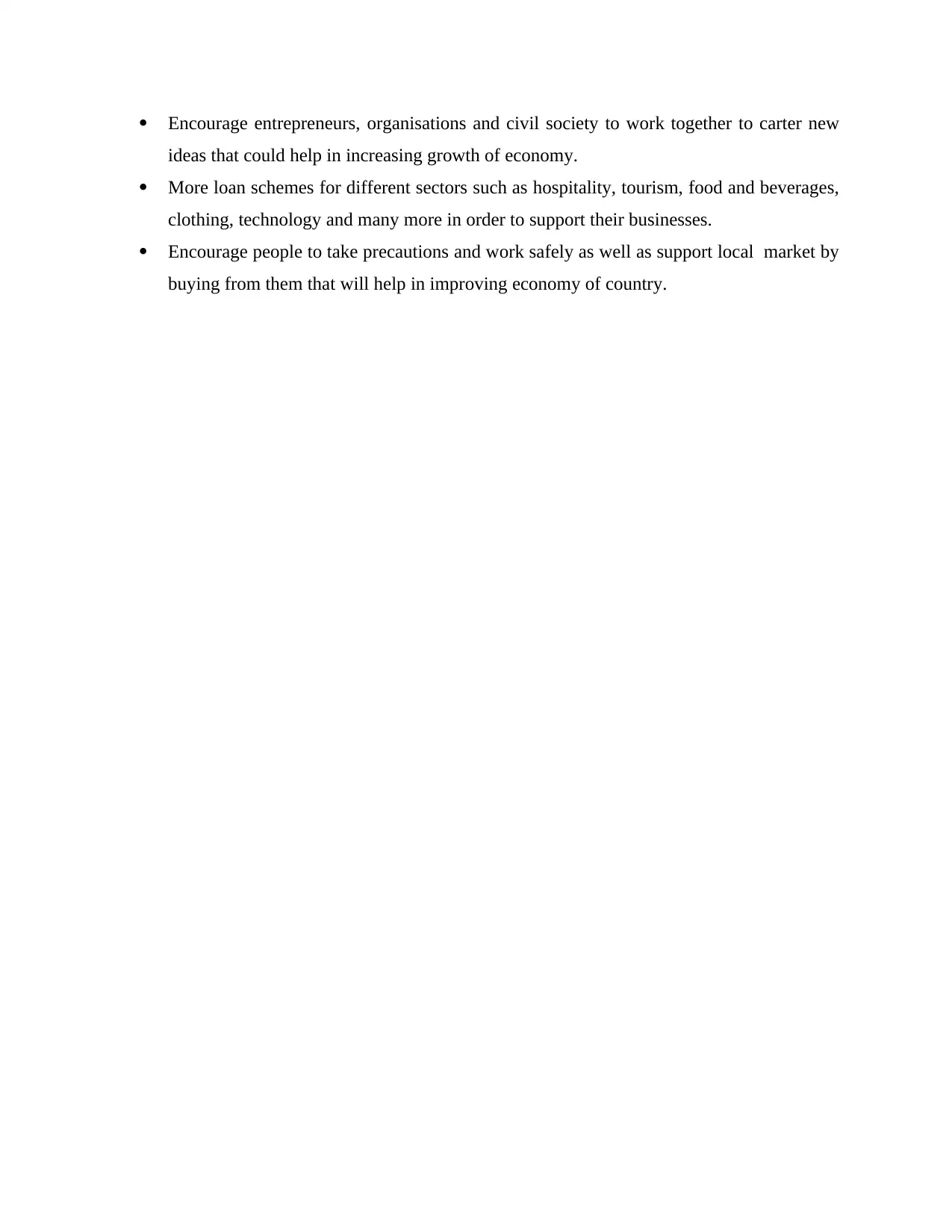
Encourage entrepreneurs, organisations and civil society to work together to carter new
ideas that could help in increasing growth of economy.
More loan schemes for different sectors such as hospitality, tourism, food and beverages,
clothing, technology and many more in order to support their businesses.
Encourage people to take precautions and work safely as well as support local market by
buying from them that will help in improving economy of country.
ideas that could help in increasing growth of economy.
More loan schemes for different sectors such as hospitality, tourism, food and beverages,
clothing, technology and many more in order to support their businesses.
Encourage people to take precautions and work safely as well as support local market by
buying from them that will help in improving economy of country.
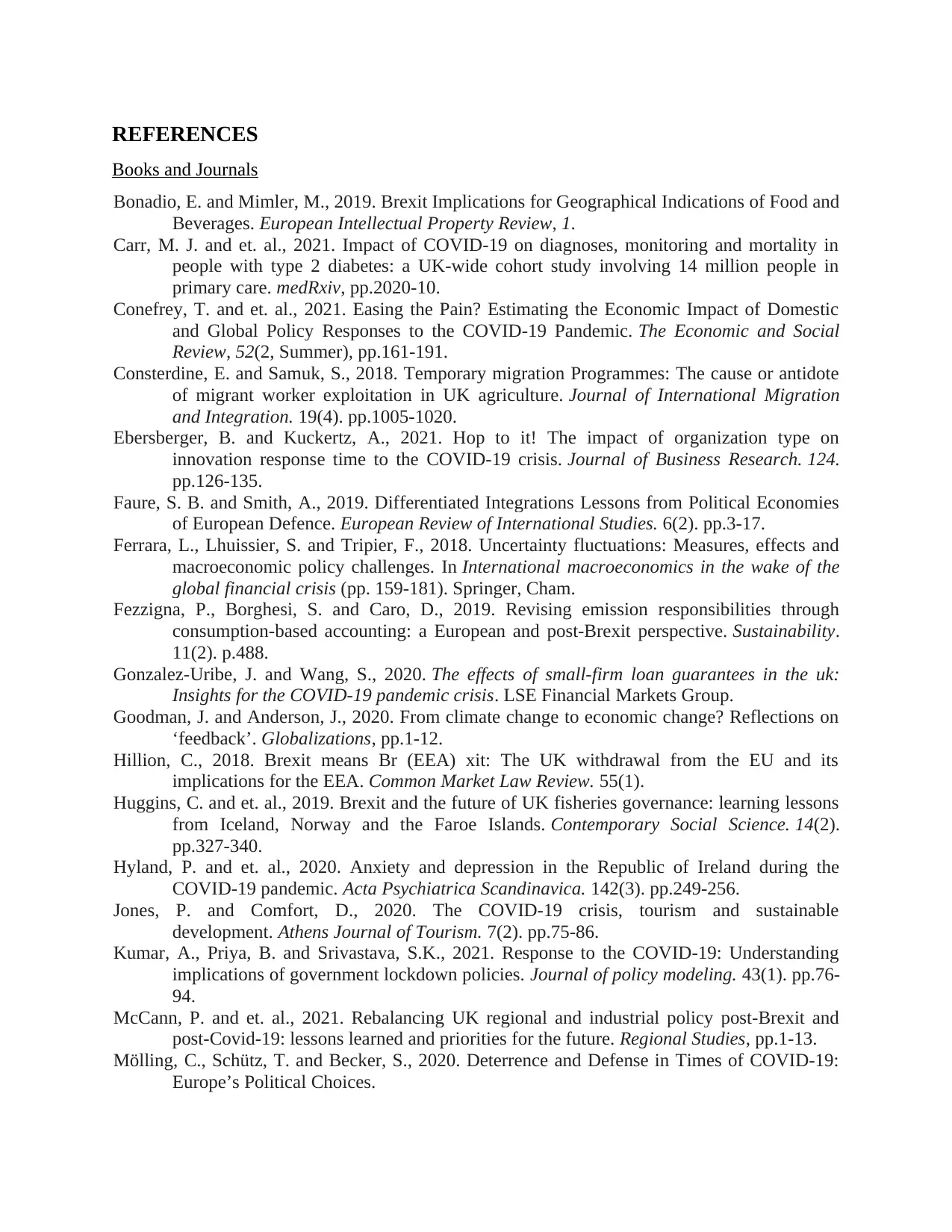
REFERENCES
Books and Journals
Bonadio, E. and Mimler, M., 2019. Brexit Implications for Geographical Indications of Food and
Beverages. European Intellectual Property Review, 1.
Carr, M. J. and et. al., 2021. Impact of COVID-19 on diagnoses, monitoring and mortality in
people with type 2 diabetes: a UK-wide cohort study involving 14 million people in
primary care. medRxiv, pp.2020-10.
Conefrey, T. and et. al., 2021. Easing the Pain? Estimating the Economic Impact of Domestic
and Global Policy Responses to the COVID-19 Pandemic. The Economic and Social
Review, 52(2, Summer), pp.161-191.
Consterdine, E. and Samuk, S., 2018. Temporary migration Programmes: The cause or antidote
of migrant worker exploitation in UK agriculture. Journal of International Migration
and Integration. 19(4). pp.1005-1020.
Ebersberger, B. and Kuckertz, A., 2021. Hop to it! The impact of organization type on
innovation response time to the COVID-19 crisis. Journal of Business Research. 124.
pp.126-135.
Faure, S. B. and Smith, A., 2019. Differentiated Integrations Lessons from Political Economies
of European Defence. European Review of International Studies. 6(2). pp.3-17.
Ferrara, L., Lhuissier, S. and Tripier, F., 2018. Uncertainty fluctuations: Measures, effects and
macroeconomic policy challenges. In International macroeconomics in the wake of the
global financial crisis (pp. 159-181). Springer, Cham.
Fezzigna, P., Borghesi, S. and Caro, D., 2019. Revising emission responsibilities through
consumption-based accounting: a European and post-Brexit perspective. Sustainability.
11(2). p.488.
Gonzalez-Uribe, J. and Wang, S., 2020. The effects of small-firm loan guarantees in the uk:
Insights for the COVID-19 pandemic crisis. LSE Financial Markets Group.
Goodman, J. and Anderson, J., 2020. From climate change to economic change? Reflections on
‘feedback’. Globalizations, pp.1-12.
Hillion, C., 2018. Brexit means Br (EEA) xit: The UK withdrawal from the EU and its
implications for the EEA. Common Market Law Review. 55(1).
Huggins, C. and et. al., 2019. Brexit and the future of UK fisheries governance: learning lessons
from Iceland, Norway and the Faroe Islands. Contemporary Social Science. 14(2).
pp.327-340.
Hyland, P. and et. al., 2020. Anxiety and depression in the Republic of Ireland during the
COVID‐19 pandemic. Acta Psychiatrica Scandinavica. 142(3). pp.249-256.
Jones, P. and Comfort, D., 2020. The COVID-19 crisis, tourism and sustainable
development. Athens Journal of Tourism. 7(2). pp.75-86.
Kumar, A., Priya, B. and Srivastava, S.K., 2021. Response to the COVID-19: Understanding
implications of government lockdown policies. Journal of policy modeling. 43(1). pp.76-
94.
McCann, P. and et. al., 2021. Rebalancing UK regional and industrial policy post-Brexit and
post-Covid-19: lessons learned and priorities for the future. Regional Studies, pp.1-13.
Mölling, C., Schütz, T. and Becker, S., 2020. Deterrence and Defense in Times of COVID-19:
Europe’s Political Choices.
Books and Journals
Bonadio, E. and Mimler, M., 2019. Brexit Implications for Geographical Indications of Food and
Beverages. European Intellectual Property Review, 1.
Carr, M. J. and et. al., 2021. Impact of COVID-19 on diagnoses, monitoring and mortality in
people with type 2 diabetes: a UK-wide cohort study involving 14 million people in
primary care. medRxiv, pp.2020-10.
Conefrey, T. and et. al., 2021. Easing the Pain? Estimating the Economic Impact of Domestic
and Global Policy Responses to the COVID-19 Pandemic. The Economic and Social
Review, 52(2, Summer), pp.161-191.
Consterdine, E. and Samuk, S., 2018. Temporary migration Programmes: The cause or antidote
of migrant worker exploitation in UK agriculture. Journal of International Migration
and Integration. 19(4). pp.1005-1020.
Ebersberger, B. and Kuckertz, A., 2021. Hop to it! The impact of organization type on
innovation response time to the COVID-19 crisis. Journal of Business Research. 124.
pp.126-135.
Faure, S. B. and Smith, A., 2019. Differentiated Integrations Lessons from Political Economies
of European Defence. European Review of International Studies. 6(2). pp.3-17.
Ferrara, L., Lhuissier, S. and Tripier, F., 2018. Uncertainty fluctuations: Measures, effects and
macroeconomic policy challenges. In International macroeconomics in the wake of the
global financial crisis (pp. 159-181). Springer, Cham.
Fezzigna, P., Borghesi, S. and Caro, D., 2019. Revising emission responsibilities through
consumption-based accounting: a European and post-Brexit perspective. Sustainability.
11(2). p.488.
Gonzalez-Uribe, J. and Wang, S., 2020. The effects of small-firm loan guarantees in the uk:
Insights for the COVID-19 pandemic crisis. LSE Financial Markets Group.
Goodman, J. and Anderson, J., 2020. From climate change to economic change? Reflections on
‘feedback’. Globalizations, pp.1-12.
Hillion, C., 2018. Brexit means Br (EEA) xit: The UK withdrawal from the EU and its
implications for the EEA. Common Market Law Review. 55(1).
Huggins, C. and et. al., 2019. Brexit and the future of UK fisheries governance: learning lessons
from Iceland, Norway and the Faroe Islands. Contemporary Social Science. 14(2).
pp.327-340.
Hyland, P. and et. al., 2020. Anxiety and depression in the Republic of Ireland during the
COVID‐19 pandemic. Acta Psychiatrica Scandinavica. 142(3). pp.249-256.
Jones, P. and Comfort, D., 2020. The COVID-19 crisis, tourism and sustainable
development. Athens Journal of Tourism. 7(2). pp.75-86.
Kumar, A., Priya, B. and Srivastava, S.K., 2021. Response to the COVID-19: Understanding
implications of government lockdown policies. Journal of policy modeling. 43(1). pp.76-
94.
McCann, P. and et. al., 2021. Rebalancing UK regional and industrial policy post-Brexit and
post-Covid-19: lessons learned and priorities for the future. Regional Studies, pp.1-13.
Mölling, C., Schütz, T. and Becker, S., 2020. Deterrence and Defense in Times of COVID-19:
Europe’s Political Choices.
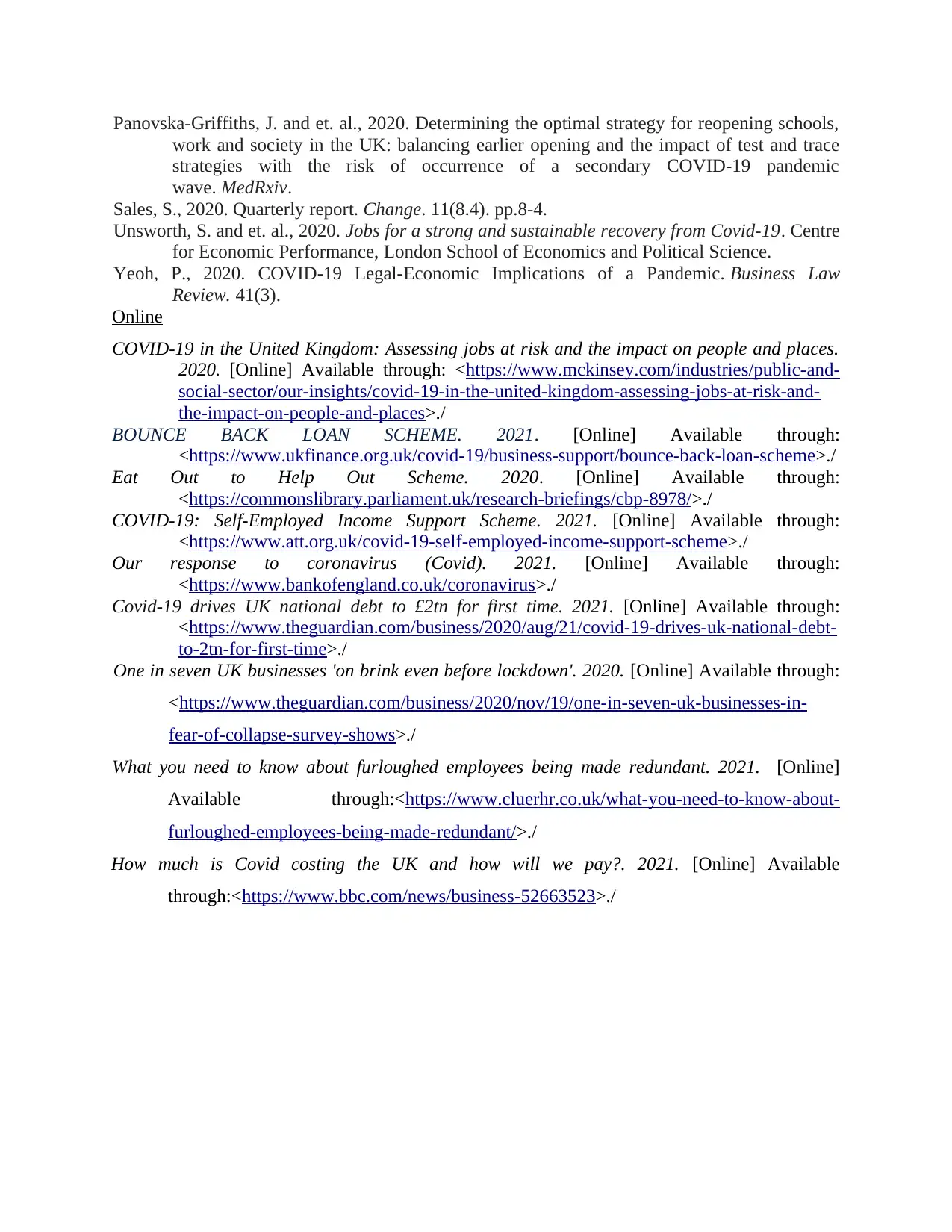
Panovska-Griffiths, J. and et. al., 2020. Determining the optimal strategy for reopening schools,
work and society in the UK: balancing earlier opening and the impact of test and trace
strategies with the risk of occurrence of a secondary COVID-19 pandemic
wave. MedRxiv.
Sales, S., 2020. Quarterly report. Change. 11(8.4). pp.8-4.
Unsworth, S. and et. al., 2020. Jobs for a strong and sustainable recovery from Covid-19. Centre
for Economic Performance, London School of Economics and Political Science.
Yeoh, P., 2020. COVID-19 Legal-Economic Implications of a Pandemic. Business Law
Review. 41(3).
Online
COVID-19 in the United Kingdom: Assessing jobs at risk and the impact on people and places.
2020. [Online] Available through: <https://www.mckinsey.com/industries/public-and-
social-sector/our-insights/covid-19-in-the-united-kingdom-assessing-jobs-at-risk-and-
the-impact-on-people-and-places>./
BOUNCE BACK LOAN SCHEME. 2021. [Online] Available through:
<https://www.ukfinance.org.uk/covid-19/business-support/bounce-back-loan-scheme>./
Eat Out to Help Out Scheme. 2020. [Online] Available through:
<https://commonslibrary.parliament.uk/research-briefings/cbp-8978/>./
COVID-19: Self-Employed Income Support Scheme. 2021. [Online] Available through:
<https://www.att.org.uk/covid-19-self-employed-income-support-scheme>./
Our response to coronavirus (Covid). 2021. [Online] Available through:
<https://www.bankofengland.co.uk/coronavirus>./
Covid-19 drives UK national debt to £2tn for first time. 2021. [Online] Available through:
<https://www.theguardian.com/business/2020/aug/21/covid-19-drives-uk-national-debt-
to-2tn-for-first-time>./
One in seven UK businesses 'on brink even before lockdown'. 2020. [Online] Available through:
<https://www.theguardian.com/business/2020/nov/19/one-in-seven-uk-businesses-in-
fear-of-collapse-survey-shows>./
What you need to know about furloughed employees being made redundant. 2021. [Online]
Available through:<https://www.cluerhr.co.uk/what-you-need-to-know-about-
furloughed-employees-being-made-redundant/>./
How much is Covid costing the UK and how will we pay?. 2021. [Online] Available
through:<https://www.bbc.com/news/business-52663523>./
work and society in the UK: balancing earlier opening and the impact of test and trace
strategies with the risk of occurrence of a secondary COVID-19 pandemic
wave. MedRxiv.
Sales, S., 2020. Quarterly report. Change. 11(8.4). pp.8-4.
Unsworth, S. and et. al., 2020. Jobs for a strong and sustainable recovery from Covid-19. Centre
for Economic Performance, London School of Economics and Political Science.
Yeoh, P., 2020. COVID-19 Legal-Economic Implications of a Pandemic. Business Law
Review. 41(3).
Online
COVID-19 in the United Kingdom: Assessing jobs at risk and the impact on people and places.
2020. [Online] Available through: <https://www.mckinsey.com/industries/public-and-
social-sector/our-insights/covid-19-in-the-united-kingdom-assessing-jobs-at-risk-and-
the-impact-on-people-and-places>./
BOUNCE BACK LOAN SCHEME. 2021. [Online] Available through:
<https://www.ukfinance.org.uk/covid-19/business-support/bounce-back-loan-scheme>./
Eat Out to Help Out Scheme. 2020. [Online] Available through:
<https://commonslibrary.parliament.uk/research-briefings/cbp-8978/>./
COVID-19: Self-Employed Income Support Scheme. 2021. [Online] Available through:
<https://www.att.org.uk/covid-19-self-employed-income-support-scheme>./
Our response to coronavirus (Covid). 2021. [Online] Available through:
<https://www.bankofengland.co.uk/coronavirus>./
Covid-19 drives UK national debt to £2tn for first time. 2021. [Online] Available through:
<https://www.theguardian.com/business/2020/aug/21/covid-19-drives-uk-national-debt-
to-2tn-for-first-time>./
One in seven UK businesses 'on brink even before lockdown'. 2020. [Online] Available through:
<https://www.theguardian.com/business/2020/nov/19/one-in-seven-uk-businesses-in-
fear-of-collapse-survey-shows>./
What you need to know about furloughed employees being made redundant. 2021. [Online]
Available through:<https://www.cluerhr.co.uk/what-you-need-to-know-about-
furloughed-employees-being-made-redundant/>./
How much is Covid costing the UK and how will we pay?. 2021. [Online] Available
through:<https://www.bbc.com/news/business-52663523>./
1 out of 13
Related Documents
Your All-in-One AI-Powered Toolkit for Academic Success.
+13062052269
info@desklib.com
Available 24*7 on WhatsApp / Email
![[object Object]](/_next/static/media/star-bottom.7253800d.svg)
Unlock your academic potential
© 2024 | Zucol Services PVT LTD | All rights reserved.



